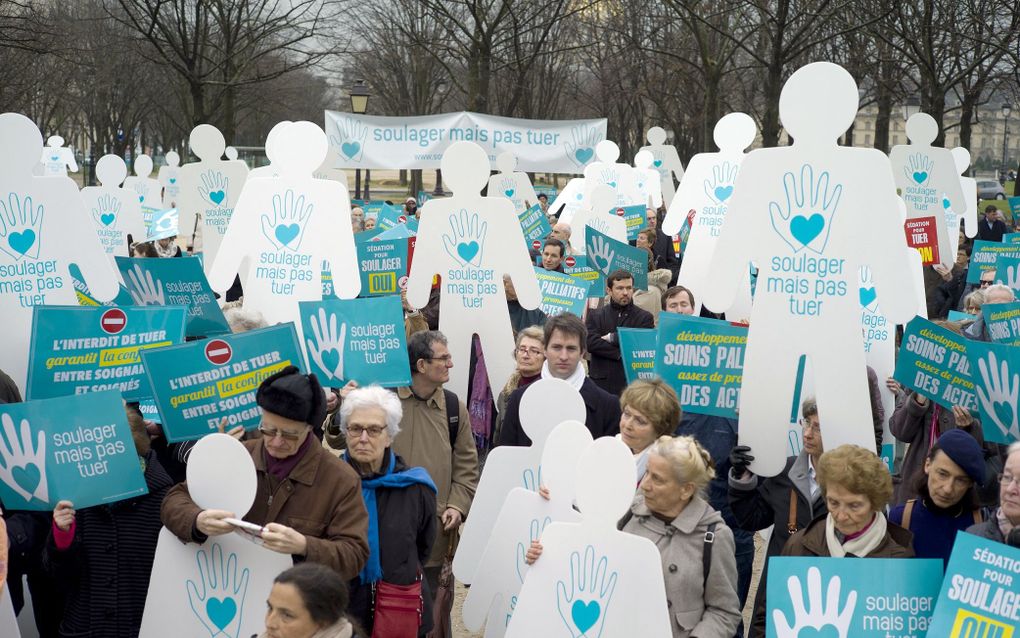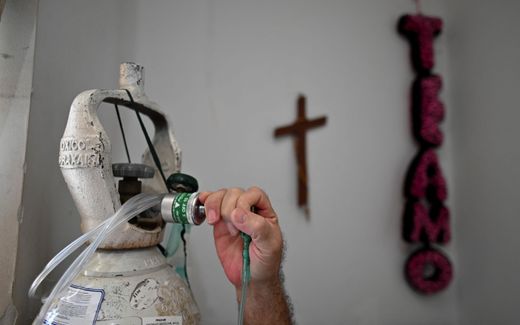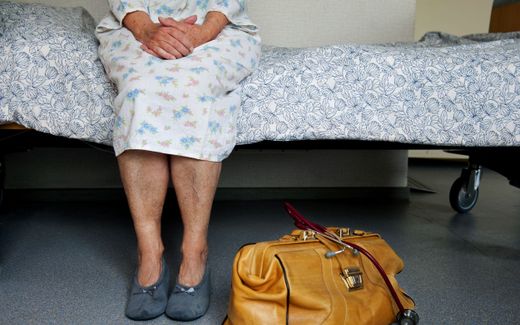French start end-of-life debate
09-12-2022
Western Europe
Mark Wallet, RD

Activists of the group "Soulager mais pas tuer" ("Bring relief, but do not kill") protest against euthanasia. Photo AFP, Kenzo Tribouillard
Western Europe
More than 170 French citizens will consider French end-of-life legislation starting Friday. They must answer one question: is the current law adequate in practice, or are adjustments needed?
It is during campaign time, March 31, when in the western French coastal town of Fouras, a woman and an incurably ill man approach President Emmanuel Macron. They urge him to legalise euthanasia. "I will give you a personal opinion," Macron replied. "I am in favour of a transition to the Belgian model." In practice, that means room for active euthanasia, even for minors, where appropriate.
Shortly afterwards, Macron's party colleague Richard Ferrand specifies the President's statements a little more. He stated on Franceinfo on April 11 that Macron will strive to enshrine the "right to die with dignity" in law.
Macron's desired course is thus clearly set out. The French President wants a broad public debate on euthanasia, which he had already announced in March. The means to that end is a citizens' platform, in which a cross-section of French society is to evaluate the current legislation. Based on the advice from this body, a bill will then be sent to parliament or a referendum.
On September 13, the Elysée officially announced the arrival of the citizens' platform, already accompanied by a call to "treat this delicate subject with great respect and caution".
Support
It seems Macron does not have much to lose with such a citizens' consultation. Surveys have shown time and again that an overwhelming majority of French people are in favour of the possibility of euthanasia, although plenty of questions remain about the conditions. Moreover, the President is supported by a recent ruling of the CNCC National Ethical Advisory Committee. The influential advisory board certainly does not opt for the Belgian model but sees room for "active assistance in dying" for the first time.
Under current law, active euthanasia, or the administration of life-ending drugs, is prohibited in France. However, room for passive euthanasia, or heavy sedation, did emerge in recent decades. Health workers are thus allowed to turn off ventilators and administer strong medication to relieve pain and speed up the dying process. As recently as 2016, the Cleays-Leonetti Act strengthened patients' rights to have treatment stopped.
The question for the citizens' platform to discuss is whether this legislation is adequate and, if not, where adjustments are needed. In recent weeks, the Economic, Social and Environmental Council has been searching for 173 French people who want a say on the matter. The council's President, Thierry Beaudet, told Le Journal du Dimanche on Sunday that it had succeeded in getting a diverse group together. The youngest participant is 20 years old, the oldest 87; they include city dwellers and villagers from all corners of France. Even participants from overseas have been selected. Variety was also sought in terms of backgrounds.
Neutrality
The platform will meet on Friday for an initial three-day session. Eight more will follow in the period up to Sunday, March 19 2023, all in Paris.
The citizens' platform will be chaired by left-wing parliamentarian Olivier Falorine, a declared supporter of the widespread practice of euthanasia. That choice led to some grumbling this week. Lawyer Erwan Le Morhedec, an opponent of euthanasia, called him "an extremist on euthanasia" on his popular Twitter account. In spring 2021, Falorine tabled a bill to liberalise euthanasia, including for depressed people.
Falorine, meanwhile, promised neutrality in the civic platform. He is assisted by three vice presidents, two of whom have right-wing political affiliations.
Parallel to the citizens' session, the two ministers responsible for the law will hold talks with parliamentarians, nurses, interest groups and representatives of major religions, among others.
Monsignor Antoine de Romanet already said on Monday at a debate evening at the university SciencesPo that he would like to see more emphasis on good palliative care. He said a final stage of life with palliative care had been experienced by many "as a privileged and peaceful time, during which many a reconciliation within families has taken place".
Sliding scale
Meanwhile, the broader public debate in the French media is gaining more and more attention. Dutch ethicist Theo Boer also took part in this. In an editorial in the French daily Le Monde last week, he warned the French against following the Dutch example. A sliding scale is inevitable, he said.
The French civic platform will have to consider this kind of experience from other countries while making their decision.
This article was translated by CNE.news and published by the Dutch daily Reformatorisch Dagblad on December 8, 2022
Related Articles





